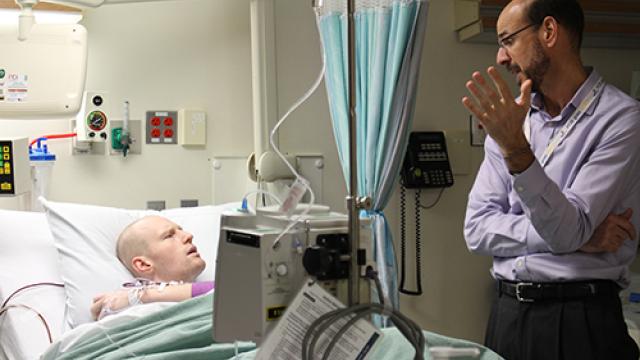
Blood cell development. A blood stem cell goes through several steps to become a red blood cell, platelet, or white blood cell.
Image Source: NIH Visuals Online, Terese Winslow
People age 3 to 25 with B-cell acute lymphoblastic leukemia (B-ALL) may be eligible to participate in a clinical trial at the NIH Clinical Center.
B-ALL is a fast-growing type of blood cancer in which too many B cells multiply in the bone marrow and blood. Haneen Shalabi, D.O., Assistant Research Physician in the Pediatric Oncology Branch, is leading a study looking at a different way of preparing patients for bone marrow transplant after they have received treatment for B-ALL. The standard preparative regimen prior to receiving a bone marrow transplant has included radiation and chemotherapy to kill as many leukemia cells as possible. Many studies have shown that treating a patient’s whole body with total body irradiation (TBI) before a stem cell transplant improves the outcome for patients in the short term. However, TBI can have negative long-term effects such as chronic health and developmental problems, especially in children.
Minimal residual disease (MRD) means that there are leftover leukemia cells in the body that were not killed by chemotherapy and radiation. Patients with MRD before their stem cell transplant have a poorer chance of survival. However, new DNA technology can detect whether B-ALL patients have MRD or not. Patients who are MRD-negative (no leftover leukemia cells) may be able to have a stem cell transplant without having to undergo TBI, thus avoiding the risk of long-term negative effects. The goal of this study is to see if B-ALL patients who are MRD-negative before their transplant and who do not have TBI prior to the transplant can survive for 2 years without relapse.
Clinicaltrials.gov identifier: NCT03509961
NCI Protocol ID: NCI-20-C-0042
Official Title: A Phase II Pilot Trial to Estimate Survival After a Non-total Body Irradiation (TBI) Based Conditioning Regimen in Patients Diagnosed With B-acute Lymphoblastic Leukemia (ALL) Who Are Pre-allogeneic Hematopoietic Cell Transplantation (HCT) Next-generation-sequence (NGS) Minimal Residual Disease (MRD) Negative
The Center for Cancer Research is NCI’s internal cancer center, a publicly funded organization working to improve the lives of cancer patients by solving important, challenging and neglected problems in cancer research and patient care. Highly trained physician-scientists develop and carry out clinical trials to create the medicines of tomorrow treating patients at the world’s largest dedicated research hospital on the campus of the National Institutes of Health in Bethesda, Maryland.
For more information on CCR clinical trials click here, and subscribe to have the latest CCR clinical trials sent directly to your inbox.


